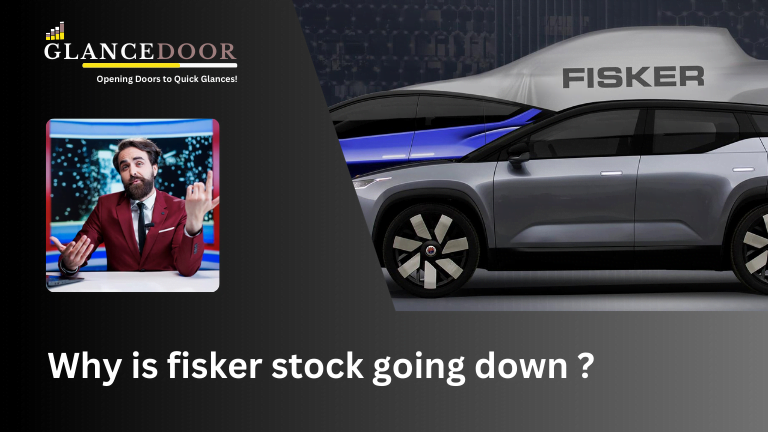Fisker Inc. (FSR), a rising star in the electric vehicle (EV) industry, has seen its stock price plummet in recent months. Let’s delve into the key factors behind this dramatic decline. Here in this article we will provide complete information about fisker stock (Fisker Inc.) along with the answer “Why is fisker stock going down?“.
Key Takeaways :
- Fisker lacks the financial resources to meet its debt obligations.
- A potential deal with a major automaker, reportedly Nissan, has fallen through.
- The company is seeking alternative financing options, including modifying terms with investors.
- Fisker is exploring strategic options such as restructuring, debt refinancing, and asset sales.
- The company faces challenges from high interest rates, supply chain delays, and a shift to a dealer-based sales model.
- Fisker has reduced its workforce by 15% and is facing an uncertain future in the volatile EV market.
Fisker Stock in Freefall: A Web of Challenges
Financial Squeeze:
- Debt Red Flags: Despite having the cash, Fisker’s decision to skip a recent debt payment to discuss its “capital structure” with investors has raised concerns about their financial health. This unusual move suggests potential cash flow problems.
- Funding Struggles: Like many young EV companies, Fisker faces difficulty securing funding due to low revenue and a fiercely competitive landscape.
Production and Delivery Woes:
- Logistical Nightmares: Fisker fell short of its delivery targets in 2023 due to logistical issues, hindering revenue generation and dampening investor confidence.
- Model Shift Uncertainty: The company’s pivot to a dealer-partner model, while potentially increasing reach, introduces uncertainties about control and efficiency in the long run.
Market Pressures:
- A Crowd Too Big: The EV market is becoming increasingly crowded, with established automakers like Tesla and Ford offering competitive electric SUVs. This fierce competition makes it harder for Fisker to stand out.
- Economic Headwinds: A tough economic climate makes it harder for startups like Fisker to secure funding and attract customers who might be tightening their belts.
Delisting Threat Looms:
- Share Price Plunge: Fisker’s stock price has fallen below the New York Stock Exchange’s listing standards, raising the possibility of delisting from the major exchange.
- Potential Defaults: Delisting could trigger defaults on convertible debt, further jeopardizing financial stability and investor trust.
This confluence of challenges has spooked investors, leading to a significant sell-off of Fisker stock. The company’s future hinges on successfully navigating these obstacles and finding ways to secure partnerships or additional funding. They also need to streamline production and deliveries to gain a foothold in the competitive EV market.
Detailed Explanation:
- Fisker has filed a document with the SEC stating that it does not have the financial resources to meet its debt payments due in 2026 and 2025. This raises concerns about the company’s long-term viability.
- A potential deal with a major automaker that could have provided a financial lifeline has fallen through. This leaves Fisker with fewer options for raising capital.
- The company is seeking alternative financing options, including modifying terms with investors. However, it is unclear if these efforts will be successful.
- Fisker is exploring strategic options such as restructuring, debt refinancing, and asset sales. These options could help the company reduce its debt burden and improve its financial stability.
- The company faces challenges from high interest rates, supply chain delays, and a shift to a dealer-based sales model. These factors have contributed to lower sales and increased costs.
- Fisker has reduced its workforce by 15% in an effort to cut costs. However, this may not be enough to ensure the company’s long-term survival.
- The EV market is volatile and competitive, and Fisker faces an uncertain future. The company’s success will depend on its ability to raise capital, address its financial challenges, and execute its business plan effectively.
Video source: CNBC
New York Stock Exchange Delists Fisker Stock, Citing Low Share Price
The New York Stock Exchange (NYSE) announced on Monday it would initiate the delisting process for Fisker Inc. (FSR) stock. This move comes amid ongoing financial struggles for the electric vehicle (EV) manufacturer. Fisker expects its delisted shares to find a new home on an over-the-counter (OTC) market, potentially the OTC Pink platform operated by OTC Markets Group.
The delisting serves as another blow to Fisker, already grappling with intense competition, product quality concerns, and a softening demand for EVs. The company’s financial health has been steadily deteriorating, prompting reports in the Wall Street Journal this month suggesting a potential bankruptcy filing could be imminent.
The NYSE cited Fisker’s “extremely low” share price as the primary reason for delisting and immediately halted trading in the stock. Shares were hovering around 9 cents at the time, representing a staggering 95% decline year-to-date.
While the NYSE decision can be appealed, Fisker acknowledged in a subsequent filing that delisting would trigger a mandatory repurchase offer for its unsecured 2.5% convertible notes maturing in 2026. Additionally, it would constitute a default on their senior secured convertible notes due in 2025. This default would grant holders of the 2025 notes the right to accelerate their notes, making them immediately due and payable.
Key Points:
- NYSE initiates delisting process for Fisker stock due to low share price.
- Fisker anticipates OTC market listing for delisted shares.
- Delisting triggers potential defaults on convertible debt.
- Fisker holds right to appeal NYSE decision.
The New York Stock Exchange (NYSE) has delisted Fisker because the stock price has fallen to exceptionally low levels, and has also halted trading in the stock. In 2021, Fisker projected to sell 200,000 vehicles in 2030, currently it does not produce any. pic.twitter.com/mZGYPaj1e0
— The Smart Investor Tool (@investor_tool) March 27, 2024
Additional details about Fisker and the potential deal:
- Founded in 2016, Fisker is a California-based electric vehicle startup.
- Since going public in 2020, they’ve delivered only a limited number of vehicles.
- The company has spent over $1 billion since its IPO.
- The identity of the automaker remains undisclosed, but reports suggest it’s a major industry player.
- A deal with such a company would provide Fisker with critical resources and capital.
- The success of the negotiations is uncertain.
- Failure to reach an agreement could lead to Fisker filing for bankruptcy.
Why is fisker stock going down?
Fisker, an electric car company still getting started, surprised everyone by skipping a $8.41 million debt payment that was due on March 15th. Even though they have the money, Fisker wants to use a one-month window to chat with their investors about how they’re managing their finances (capital structure).
This confluence of challenges has spooked investors, leading to a significant sell-off of Fisker stock. The company’s future hinges on successfully navigating these obstacles and finding ways to secure partnerships or additional funding. They also need to streamline production and deliveries to gain a foothold in the competitive EV market.
Why is Fisker stock crashing?
Fisker’s stock is crashing due to several reasons:
Financial concerns: skipped debt payment, potential cash flow problems
Funding challenges: difficulty securing funding due to low revenue
Production and delivery issues: fell short of delivery targets in 2023
Market competition: intense competition in the EV market
Delisting threat: stock price fell below NYSE’s listing standards
Economic conditions: tough economic climate
Is Fisker going to survive?
The survival of Fisker is uncertain, and it will depend on how effectively the company addresses its current challenges. Securing additional funding, improving its financial health, overcoming production and delivery issues, and successfully navigating the competitive EV market will be crucial for Fisker’s survival.
Will Fisker stock go back up?
The future trajectory of Fisker’s stock price is uncertain and depends on several factors, including the company’s ability to address its current challenges, secure partnerships or funding, and differentiate itself in the competitive EV market. While there is no guarantee, successful execution of these strategies could potentially lead to an increase in Fisker’s stock price.
Is Fisker stock worth buying?
The decision to buy Fisker stock depends on individual investment goals, risk tolerance, and belief in the company’s future prospects. It’s important to conduct thorough research, consider the company’s financial health, competitive position, and industry trends before making any investment decisions. Consulting with a financial advisor can also provide valuable insights tailored to your specific situation.
What will Fisker stock price be in 2025?
Predicting the future stock price of Fisker or any other company is highly speculative and influenced by numerous unpredictable factors, including market conditions, company performance, industry trends, and macroeconomic factors. As such, it is impossible to accurately forecast Fisker’s stock price in 2025. Investors should conduct their own research and consider various factors before making investment decisions.
Fisker stock price
Please follow this link for latest price https://g.co/finance/FSRN:OTCMKTS
Fisker stock forecast
Current Situation: As of March 26, 2024, Fisker stock (FSRN) is trading on the OTC Markets at around $0.0265, which is a significant drop from its opening price that day and a massive decline from its highs earlier in the year.
Analyst Ratings: Earlier analyst ratings for Fisker on the NYSE (before delisting) showed an average 12-month price target of around $1.11 with a high target of $2.05. However, these ratings may not be very relevant given the current situation.
Financial Troubles: Recent news highlights Fisker’s financial struggles, including debt obligations they can’t currently meet and a failed potential deal with a major automaker. This casts a shadow on the company’s future and its ability to raise capital.
Delisting: The delisting from the NYSE due to low share price further complicates the picture and may make it harder for Fisker to attract investors.
Overall, the outlook for Fisker stock is currently uncertain. The company faces significant financial challenges, and its future depends on its ability to secure funding and navigate the competitive electric vehicle market.
Why is shiba inu going up?
Please read full article here

